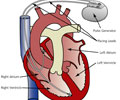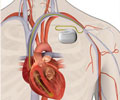An arrhythmia is any disorder of your heart rate or rhythm. It means that your heart beats too quickly, too slowly or with an irregular pattern. Most arrhythmias result from problems in the electrical system of the heart. If your arrhythmia is serious, you may need one of two devices implanted under your skin: a cardiac pacemaker or an implantable cardioverter defibrillator (ICD).
A pacemaker monitors the electrical impulses in the heart. When needed, it delivers electrical pulses to make the heart beat in a more normal rhythm. A pacemaker may be helpful when the heart beats too slowly or has other abnormal rhythms. An ICD is a device that monitors heart rhythms. If it senses dangerous rhythms, it delivers shocks. Many ICDs record the heart's electrical patterns when there is an abnormal heartbeat. This can help the doctor plan future treatment.
Pacemakers and Implantable Defibrillators



